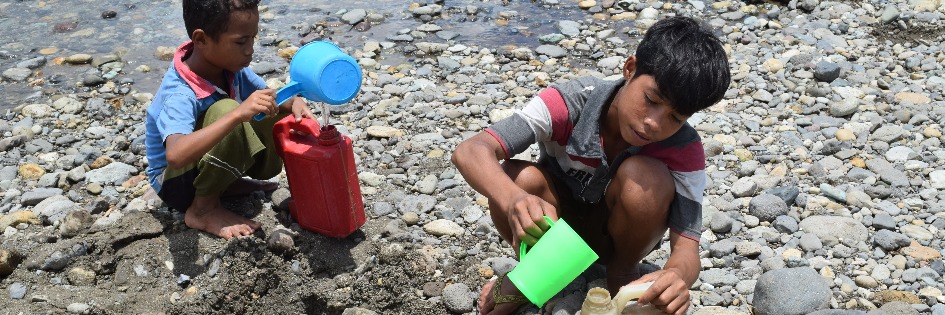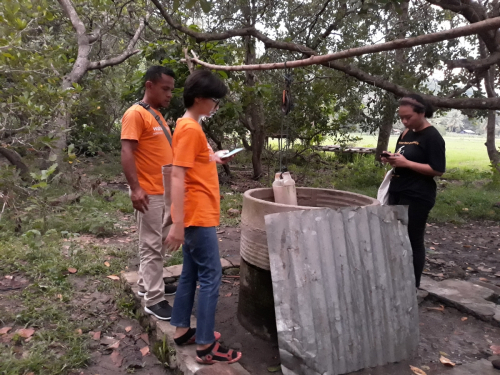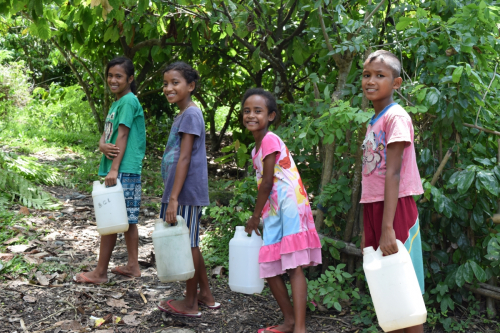
Ende Water is Near by Millennium Hotels and Resorts
from Clean Water and Sanitation
by World Vision Singapore
* This campaign is for Millennium Hotels and Resorts employees

Millennium Hotels and Resorts is partnering with World Vision to help improve the water, sanitation and hygiene facilities in rural villages of Ende, Indonesia.
In Ende district, villages have limited or malfunctioning water supply facilities in need of repair/renovation. The distance between the nearest water sources and the villages are also a distance away (between 2 km – 5 km away). Children usually have to walk arduous journeys to draw water from these sources in the morning and evening to help meet the family’s water needs.
The lack of clean drinking water in the villages have caused preventable water borne diseases like diarrhea and skin diseases. In Ende, Wewaria and Detusoko districts had the highest rate of diarrhea cases among the districts in 2018 .

Abandoned open-dug well in Mautenda village due to high lime content
 Fataatu Timur_edit.jpg)
Current condition of water spring receptacle in Fataatu Timur village
With your support, World Vision aims to help 4,622 people and 1,068 households from 5 villages in 2 sub-districts by:
- Constructing water supply facilities – eg. water pipeline, reservoir, wells and taps in order to provide increased and closer access to clean water
- Establish village water committees – to help communities to manage the utilisation and maintain the system and infrastructure built in the villages on their own; they also have a role in establishing village regulations related to clean water construction and maintaining
Please join us to provide clean and safe drinking water to needy communities in Ende, so children can enjoy better health and focus on their studies, without fetching water daily.
_____________________________________________________
Feature Story: A Dream for Water to be Near
Icha (left; in purple shirt) lives in Mautenda village in Ende, Indonesia. Every day, the 11-year-old must walk for 25 minutes to an hour under the hot sun and through a steep, hilly terrain, just to fetch water.
She makes the arduous journey before or after school in order to help fulfill her family’s daily water needs.
There are 2 water reservoirs in Icha’s village which are located in 2 springs where the community members fetch water from. The water in one of the reservoirs is turbid and full of mud. The community uses water from this reservoir for bathing and laundry, while water from the other reservoir in the other spring is used for cooking and drinking. It is even more challenging during the dry season where water needs increase but the water supply decreases.
As a result of this water-fetching responsibility, especially in the morning, Icha and her friends always feel tired before even starting school. Their energy is drained. It is difficult for them to focus at school and often fall asleep during class instead. Another drawback of this poor access to clean water is that many children defecate in an open area.
“We also rarely take a bath or brush our teeth before school,” added Icha and her friends.
Maria, 30, a housewife living in Watujuke Sub-village, also experiences similar conditions as Icha. Watujuke women must walk long distances to fetch water before tending to their work in the fields. The water that they fetch is used to fulfil basic household needs, such as dishwashing, sanitation, drinking water for the whole family.
She noticed that children are also exposed to physical violence from adults should they refuse to help fetch water for the household. She hopes that they do not have to fetch water from faraway sources anymore so that they can have more time and energy to go to school and rest and after that.

raised out of
S$3,000
Campaign contributors
- S$200
Paul Kitamura
2022-12-13 16:31:07
- S$100
Zhuang Hongwei
2022-12-13 14:23:43
- S$20
Small Fry
2022-12-13 14:20:03
- S$100
KQ
2022-12-13 11:57:52
- S$200
Mandy
2022-12-13 11:41:43
- S$100
Edeline Tiong
2022-12-13 11:39:36
- S$50
Anonymous
2022-12-13 10:50:45
- S$100
Fay Leong
2022-12-13 10:48:21
- S$50
Anonymous
2022-12-13 10:40:20
- S$50
Anonymous
2022-12-13 10:39:13
- S$100
Yuqi Lin
2022-12-13 10:16:19
- S$50
Yvonne Chia
2022-12-09 18:31:06
- S$50
Anonymous
2022-12-05 11:11:24
- S$20
Desmond Tay
2022-12-05 10:57:55
- S$100
Saurabh Prakash
2022-12-05 10:21:59
- S$50
Lim Cheng Siong (Keith)
2022-12-05 09:44:18
- S$50
Lee Xin Li
2022-12-03 17:16:41
- S$50
Macgyver Wong
2022-12-02 23:51:40
- S$100
Zeng Shujuan
2022-12-02 19:22:54
- S$50
Ong Keng Yang
2022-12-02 16:25:31
